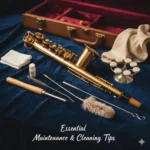Did you know that wind instruments also improve your breathing and lung capacity, along with providing fun? This happens because playing wind instruments motivates continuous respiratory muscle training, which is known to help. This is also much better than standard breathing exercises that only help to an extent. The effects may depend on person to person, especially in the case of healthy individuals.
Effects can be seen more profoundly in patients suffering from respiratory issues, as wind instruments help show improvement. This conclusion is made from all the studies done on patients having issues like Asthma, which proves the same.
Table of Contents
ToggleHow Wind Instruments Improve Breathing?
Diaphragmatic Breathing:
To play any wind instrument, a diaphragm is required for use, so that the airflow can be controlled the right way. This is done for strained muscle notes, where the diaphragm is strengthened. Along with that, other core breathing muscles are also strengthened with the use of wind instruments.
Breath Control:
The speed as well as the amount of air exhaled is something practiced by many musicians to gain control over them. This practice is very helpful for your lungs, as better breathing management can be a result of that.
Increased Lung Capacity:
Naturally, your lungs will get better as they work more efficiently after all the breathing practices you’ve done while playing wind instruments. This may lead to larger lung volumes with better function as well, where wind instruments play a role.
Motivating Exercise:
If we talk about breathing practices related to respiratory training, then they’re not really as motivating. Instrumental playing, on the other hand, is fun and engaging, along with helping you breathe better.

Benefits in Specific Conditions
Asthma:
Asthma is getting worse in teenagers day by day for many reasons, where wind instruments may play a role in improvement. Playing these instruments can actually improve pulmonary function, which is known to reduce the symptoms. Emotional well-being is also improved for individuals with Asthma after the use of these instruments, even for fun.
Obstructive Sleep Apnea (OSA):
If you specifically play instruments like the didgeridoo, then this wind instrument is known to help with issues like OSA.
Chronic Obstructive Pulmonary Disease (COPD):
Issues related to COPD, like shortness of breath, may also be improved with wind instruments. This improvement may be seen after music therapy involving wind instruments, as they are known to help.
Broader Health Benefits:
Apart from the above benefits, wind instruments are also known to offer broader health benefits. These include cardiopulmonary endurance as well, which is a big benefit affecting the quality of life.
Scientific Evidence –
Studies on Patients:
Many studies have been made on patients suffering from respiratory issues, which prove the involvement of wind instruments. The research in those studies shows how respiratory rehabilitation may be possible through wind instruments in many cases. These studies also indicate that playing these instruments may be more effective than respiratory training.
Correlation with Better Health:
There is a high level of health awareness among most wind musicians, which also produces outcomes through constant practice. This is done through the respiratory training that is provided by these instruments, which helps a lot for better health.
Factors Influencing Lung Function –
Practice Duration:
The amount of time spent playing wind instruments also matters in improving lung function, as long-term practices affect it better.
Musician Profile:
Another factor may be the spirometry, which may be better in musicians or singers compared to others, which is a plus point.
Confounding Factors:
- Age
- Sex
- Height
- Weight
Conclusion
Wind Instruments are known to help with lung health, along with the fun they provide to musicians. There are scientific proofs of the benefits they provide for better health, with different studies, as many respiratory issues are helped with. Patients suffering from issues like Asthma and COPD have reported less evident symptoms with these instruments.
FAQs
Q – Is it good for my lungs to play wind instruments?
A – Yes, wind instruments are good for your lung health, as you may see improvement in the overall function with the training.
Q – Which diseases are helped with wind instruments?
A – Playing wind instruments may help with many issues, including:
- COPD
- Asthma
- Obstructive Sleep Apnoea
- Alzheimer’s disease
- Parkinson’s disease
- Dementia
Q – How does a flute help with lung health improvement?
A – A flute can help in the following ways:
- Controlled breathing
- Strengthened breathing muscles
- Improved your mental well-being
Q – Can I try wind instruments even though I have asthma?
A – Yes, you actually can because those instruments will help with your condition instead of worsening.




